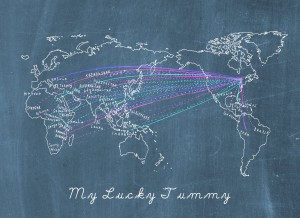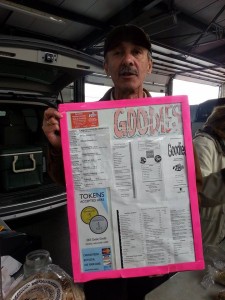The future of the refugee foodways in Syracuse cannot be defined as a simple one-way interaction, such as the creation of more culturally appropriate food access points. It is a mutual exchange between the people who have resettled here and the city itself. This mutual exchange has allowed for the creation of cultural and educational events, new demands for different produce in food production, and new economic opportunities for the refugee community through food. Through interviews with key informants, we have laid out a few predictions of the exciting and dynamic nature of the refugee foodways.
Cultural Events & Education
Adam Sudmann // My Lucky Tummy

Adam Sudmann is the founder of My Lucky Tummy, a pop-up food court that focuses on helping expose the refugee culture to the Syracuse community as well as help to form an appreciation for their food and valuable knowledge they bring to the table. He believes food is a great repository for memories and really emphasizes the importance of the refugee community within the overall Syracuse community.
The Need for More Land
Professor Matt Potteiger // SUNY-ESF, Landscape Architecture
Currently the agricultural initiatives for refugees are mainly cited for their social benefits, such as maintaining a cultural connection to their country of origin and getting involved with the broader Syracuse community. However, these community gardens do not fully address food security or the potential food production has to provide sustainable income for refugees. One of the reasons for this is the availability of land. While community gardens such as the Isabella Street Tapestry Garden and the Karibu Community Garden have been praised for reviving the neighborhood, the scale at which they operate is not viable to fully sustain a family (nutritionally or economically). The Salt City Harvest Farm begins to address this issue by operating outside of the city limits where land is more available to cultivate at a larger scale and has room for expansion.
Importance of CNY Regional Market
Ben Vitale // CNY Regional Market Director

Goodies Mediterranean Grill and Cuisine’s Stall in CNY Regional Market. He imports food products regularly from Lebanon.
Ben Vitale is the director of the Central New York Regional Market which on any given Saturday during the harvest season can serve up to 26,000 people from all around the region. Many refugees living on the Northside of Syracuse actually walk down to the market or drive. The market also offers job opportunities and allows for new culturally appropriate products to be introduced into the market place.
Entrepreneurship
Jonathan Logan // Northside Urban Partnership, Program Manager – Place Making and Small Business Development
The growing refugee population provides greater opportunities to open new businesses, such as restaurants and grocery stores. The creation of new businesses on the Northside creates walkable stores for many refugees that help serve their needs. It is also an opportunity to revitalize the neighborhood by filling up storefronts, and creating greater exposure to different cultures within the community. However, refugees need support of starting businesses, such as learning how to start a business, and being aware of cultural differences of managing a business, e.g., the tipping culture in the United States if they open a restaurant.
Refugees have a unique opportunity to open the first restaurants of their cuisine in Syracuse, where the Red Dragon House is the first Bhutanese restaurant in Syracuse. Thus, with a support system and knowledge, there are many new opportunities for refugees to become entrepreneurs themselves.